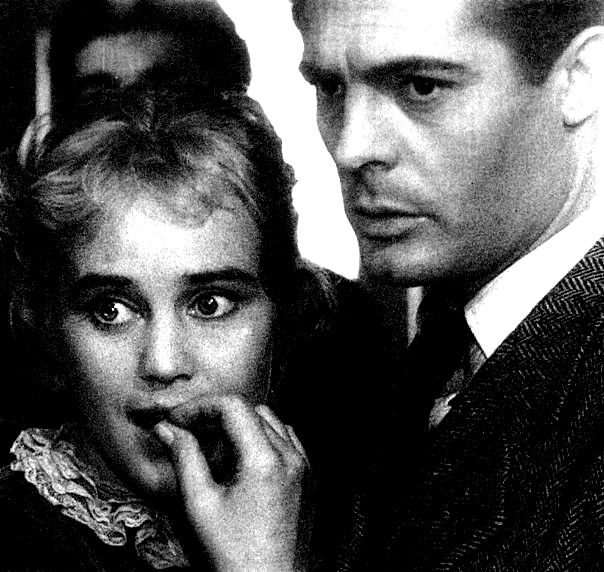Le notti bianche (1957)
Saturday, August 12, 2006

Prima facie, it is hard to imagine someone like Visconti to make a film totally on studio sets, with artificial lights and painted cardboard and so on, immediately after such classical neo-realism pieces like Ossessione(43), Terra trema(48), Bellisima(51), and before Rocco e i suoi fratelli(60). But it is more or less in line with Senso (54), adapted from formal literary works.
In general, there are too much dialogue in the film and you can smell that they are not genuine italian ones. The fault is certainly not of Visconti, but of Dostoevski. If you take a look with his original novel (which is fortunately not very long), you will understand what I mean. There the dialogue is even longer, more gratuitous and quickly becomes unbearable. Visconti has retained several details of the original, including the age of the new tenant, the pinned skirt, The Barber of Seville, the pre-written letter, etc. But Walter Scott, the author of those books that Natalia borrowed, is not mentioned. And there are tons of things added : rug repairing business, the landlady, the boss and so on.
Visconti’s real part started when Natalia started to tell her story. By a ingenious pan we are brought to past tense and immediately Jean Marais the narcissist’s face (pardon me if I hate Cocteau so much). The lighting is a stylistic one, resembling that of a stage play. From here on the narrative is simple and effective. And I have to admit, Jean Marais played his role well. He is indeed a very cool guy, always dark and brooding for some personal matters.
Then comes the most breathtaking scene in the film : the dance in the bar. Here I could almost see Antonioni, the true cinematic form of passion and frustration. You have to see the dance in L’Eclisse to understand why. It deserves a whole chapter to discuss so I am not going to talk about it here.
After the show in the bar, everything went back to normal level. The midnight snow is a good idea, but the quality of this special effect is as poor as the downsized canal and streets – hardly convincing.
All women in this film are worth looking at : Maria Schnell is an angel; the local beauty who writes Ciao on the windows is very attractive (according to my standard), Clara Calamai is gorgeous; even the landlady makes me feel warm.
Let me repeat : Maria Schnell is unforgetable. I wonder why such a gem is not appreciated by more people. I only see her once more in Réné Clément’s Gervaise. In both films, it is her performance, not anything else, that sustains the whole narrative. Her ability to express emotions and to transfer them is simply amazing.
Clara Calamai, the star from Ossessione, played the prostitute here. She is also someone added by Visconti. In the film, she conducted Mario to her usual place of doing business, some one- square-metre open space under the canal bridge, with a few rugs laying on the ground.
edit


No comments:
Post a Comment